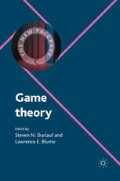Abstract
Allocation mechanisms, organizations, voting procedures, regulatory bodies, and many other institutions are designed to accomplish certain ends such as the Pareto-efficient allocation of resources or the equitable resolution of disputes. In many situations it is relatively easy to conceive of feasible processes; processes which will accomplish the goals if all participants follow the rules and are capable of handling the informational requirements. Examples of such mechanisms include marginal cost pricing, designed to attain efficiency, and equal division, designed to attain equity. Of course once a feasible mechanism is found, the important question then becomes whether such a mechanism is also informationally feasible and compatible with ‘natural’ incentives of the participants. Incentive compatibility is the concept introduced by Hurwicz (1972, p. 320) to characterize those mechanisms for which participants in the process would not find it advantageous to violate the rules of the process.
Access this chapter
Tax calculation will be finalised at checkout
Purchases are for personal use only
Preview
Unable to display preview. Download preview PDF.
Bibliography
Baron, D. and Myerson, R. 1982. Regulating a monopolist with unknown costs. Econometrica 50, 911–30.
Dasgupta, P., Hammond, P. and Maskin, E. 1979. The implementation of social choice rules: some general results on incentive compatibility. Review of Economic Studies 46, 185–216.
Gibbard, A. 1973. Manipulation of voting schemes: a general result. Econometrica 41, 587–602.
Groves, T. and Ledyard, J. 1977. Optimal allocation of public goods: a solution to the ‘free rider’ problem. Econometrica 45, 783–809.
Groves, T. and Ledyard, J. 1986. Incentive compatibility ten years later. In Information, Incentives, and Economic Mechanisms, ed. T. Groves, R. Radner and S. Reiter. Minneapolis: University of Minnesota Press.
Harris, M. and Raviv, A. 1981. Allocation mechanisms and the design of auctions. Econometrica 49, 1477–99.
Hurwicz, L. 1960. Optimality and informational efficiency in resource allocation processes. In Mathematical Methods in the Social Sciences, ed. K. Arrow, S. Karlin and P. Suppes. Stanford: Stanford University Press, 27–46.
Hurwicz, L. 1972. On informationally decentralized systems. In Decision and Organization: A Volume in Honor of Jacob Marschak, ed. R. Radner and C. B. McGuire. Amsterdam: North- Holland, 297–336.
Hurwicz, L. 1979. Outcome functions yielding Walrasian and Lindahl allocations at Nash equilibrium points. Review of Economic Studies 46, 217–25.
Ledyard, J. 1978. Incomplete information and incentive compatibility. Journal of Economic Theory 18, 171–89.
Ledyard, J. and Roberts, J. 1974. On the incentive problem with public goods. Discussion Paper No. 116, Center for Mathematical Studies in Economics and Management Science, Northwestern University.
Lindahl, E. 1919. Die Gerechtigkeit der Besteuerung. Lund. Partial translation in Classics in the Theory of Public finance, ed. R. A. Musgrave and A. T. Peacock. London: Macmillan, 1958.
Matthews, S. 1983. Selling to risk averse buyers with unobservable tastes. Journal of Economic Theory 30, 370–100.
Moore, J. and Repullo, R. 1986. Subgame perfect implementation. Working paper, London School of Economics.
Myerson, R.B. 1981. Optimal auction design. Mathematics of Operations Research 6, 58–73.
Myerson, R.B. 1985. Bayesian equilibrium and incentive compatibility: an introduction. In Social Goals and Social Organization: Essays in Memory of Elisha Pazner, ed. L. Hurwicz, D. Schmeidler and H. Sonnenschein. Cambridge: Cambridge University Press.
Palfrey, T. and Srivastava, S. 1986. Implementation in exchange economies using refinements of Nash equilibrium. Graduate School of Industrial Administration, Carnegie-Mellon University, July 1986.
Palfrey, T. and Srivastava, S. 1987. On Bayesian implementable allocations. Review of Economic Studies 54, 193–208.
Postlewaite, A. and Schmeidler, D. 1986. Implementation in differential information economics. Journal of Economic Theory 39, 14–33.
Roberts, J. and Postlewaite, A. 1976. The incentives for price-taking behavior in large economies. Econometrica 44, 115–28.
Samuelson, P. 1954. The pure theory of public expenditure. Review of Economics and Statistics 36, 387–9.
Satterthwaite, M. 1975. Strategy-proofness and Arrow’s conditions: existence and correspondence theorems for voting procedures and social welfare functions. Journal of Economic Theory 10, 187–217.
Schmeidler, D. 1980. Walrasian analysis via strategic outcome functions. Econometrica 48, 1585–93.
Walker, M. 1981. A simple incentive compatible scheme for attaining Lindahl allocations. Econometrica 49, 65–71.
Author information
Authors and Affiliations
Editor information
Editors and Affiliations
Copyright information
© 2010 Palgrave Macmillan, a division of Macmillan Publishers Limited
About this chapter
Cite this chapter
Durlauf, S.N., Blume, L.E. (2010). Incentive Compatibility. In: Durlauf, S.N., Blume, L.E. (eds) Game Theory. The New Palgrave Economics Collection. Palgrave Macmillan, London. https://doi.org/10.1057/9780230280847_16
Download citation
DOI: https://doi.org/10.1057/9780230280847_16
Publisher Name: Palgrave Macmillan, London
Print ISBN: 978-0-230-23890-9
Online ISBN: 978-0-230-28084-7
eBook Packages: Palgrave Media & Culture CollectionLiterature, Cultural and Media Studies (R0)

